CISS Hosts 2025 Social Science Writing Internship Program Showcase
On July 22, 2025, the Center for Innovation in Social Science hosted the 2025 Social Science Writing Internship Program (SWIP) showcase. The showcase featured presentations by the five student interns, and inspiring talks by expert faculty and staff writers at BU.
The SWIP program was launched in 2024 as a collaboration between the CAS Writing Program’s Writing in the Disciplines (WID) initiative and the Center for Innovation in Social Science (CISS) to provide hands-on writing experiences for students with a background in social science. The program is generously supported by University and CAS Advisory Board Member and Alumna, Jennifer Simpson (CAS’00), and the Psalm 103 Foundation.
SWIP interns were placed at a social science research institute on the BU campus for a ten-week period. This year’s sites were: CAS Communications, Center for Innovation for Social Science, Center on Forced Displacement, and Institute for Global Sustainability. Interns worked closely with their site supervisors, and carried out tasks including writing news, feature, and personality profile articles that describe the research, teaching or outreach activities carried out at their site. The interns worked approximately 15 hours per week and attended a 90-minute weekly writing workshop/seminar led by Stephen Hodin, SWIP Coordinator and Writing Program Senior Lecturer. At the weekly workshop, the interns also developed and refined their own writing projects, such as honors thesis proposals or expanding on papers they had previously written for their classes.
The July showcase opened with greetings from CISS director Deborah Carr and David Shawn, Writing Program master lecturer, SWIP Program Director, and Associate Director for Writing in the Disciplines. Alene Bouranova, Writer/Editor at BU Today and associate professor of sociology Joseph Harris shared their own personal trajectories as writers, and offered helpful advice to students who would like to share their own work – whether in academic or popular publications. The five interns then presented on their own writing products. Read on to learn more about the interns, and see scenes from the showcase!
| Intern | Placement | Independent Writing Project | |
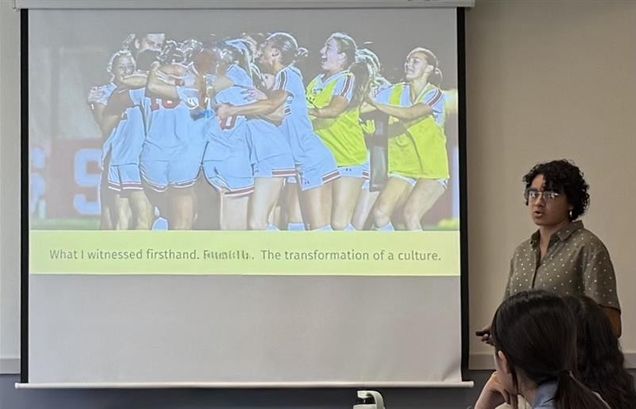 Shayla Brown (CAS’26; Anthropology) Shayla Brown (CAS’26; Anthropology) |
Center for Innovation in Social Science | “Project 32: Stories of 32 Women Navigating Division I Athletics” | Using the 2024 BU Women’s Soccer team as a case study, I will undertake an ethnographic study of this group in order to understand how team cultures are formed, sustained, and challenged — especially under the contemporary pressures of D1 (women’s) athletics. This project centers the interpersonal lives of athletes, exploring how individuals shape a team environment, while also exposing the institutional failures that too often go unexamined in elite college sports — revealing how personal dynamics and systemic issues are deeply interconnected. |
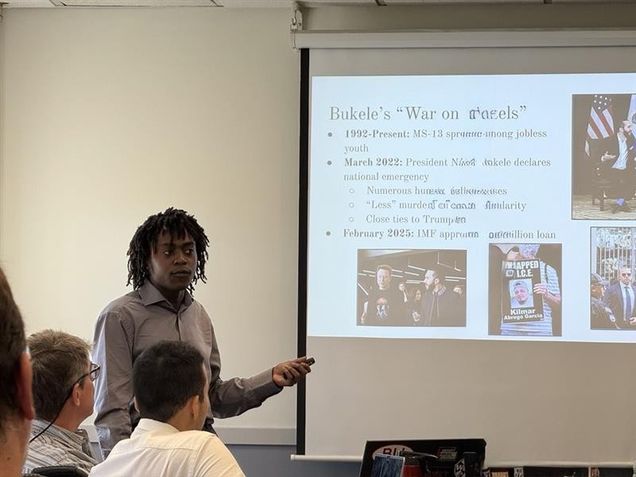 Joshua Emokpae (CAS ’26; Political Science & Classical Civilization) Joshua Emokpae (CAS ’26; Political Science & Classical Civilization) |
Center on Forced Displacement | “The International Monetary Fund’s Role in Central American Gang Violence” | Since the 1970s, the International Monetary Fund (IMF) has loaned billions of dollars to the governments of El Salvador and Mexico during times of crisis. In return, both countries slashed public spending and lifted trade protections, depriving local communities of crucial social safety nets and creating the conditions for gang recruitment to thrive. While these gangs offer considerable charitable support to impoverished neighborhoods, which have been abandoned by the state due to IMF cuts, they’re also culpable for the rampant death and chaos seen throughout the region. |
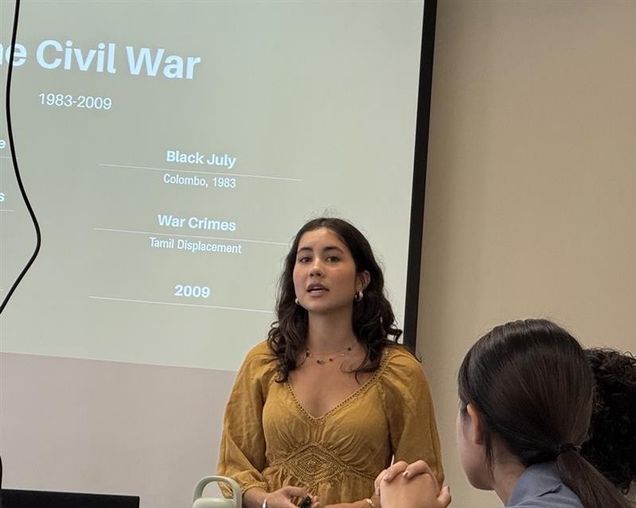 Sofia Sanchez (CAS ’26; Archaeological and Environmental Sciences) Sofia Sanchez (CAS ’26; Archaeological and Environmental Sciences) |
Institute for Global Sustainability | “Postwar Cultural Preservation for Sri Lankan Tamils: The Role of Women’s Narratives” | In northern Sri Lanka, land is not just an economic resource but a symbol of identity and belonging. In the context of resettlement and post-war reconstruction, this project aims to center women’s narratives and better understand how Tamil culture persists within a scattered diaspora. This research will serve as a valuable resource for academics, educators, and policy makers engaged in reconciliation work, minority rights advocacy, and the preservation of arts and culture. |
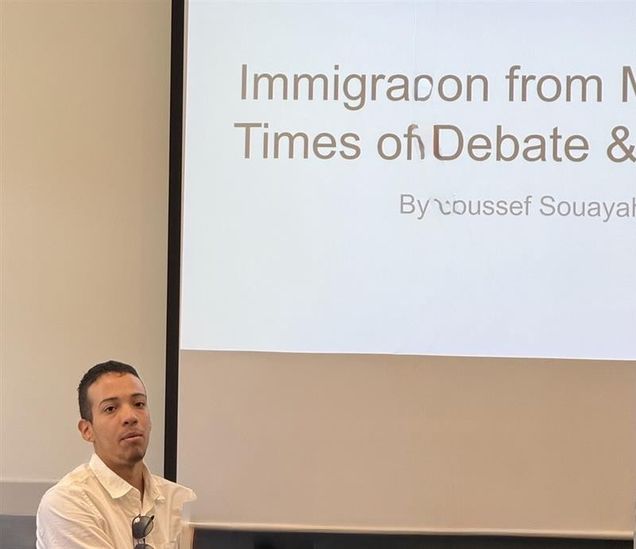 Yousseff Souayah (CAS ’27; Data Science and Political Science) Yousseff Souayah (CAS ’27; Data Science and Political Science) |
Center on Forced Displacement | “Rethinking Immigration in MENA (Middle East and North Africa)” | Having lived between two worlds—the Middle East and the United States—my entire life, I have gained a deeper understanding of the complex realities on both sides of the immigration debate. My objective is to illuminate the forces that have consistently driven migration from the MENA region and to articulate the mutual benefits of this exchange for both the United States and the people leaving their homes. Ultimately, this work seeks to demonstrate a critical truth: that closing borders can have the adverse effect of promoting dangerous, illicit immigration, undermining the very stability and security we aim to protect. |
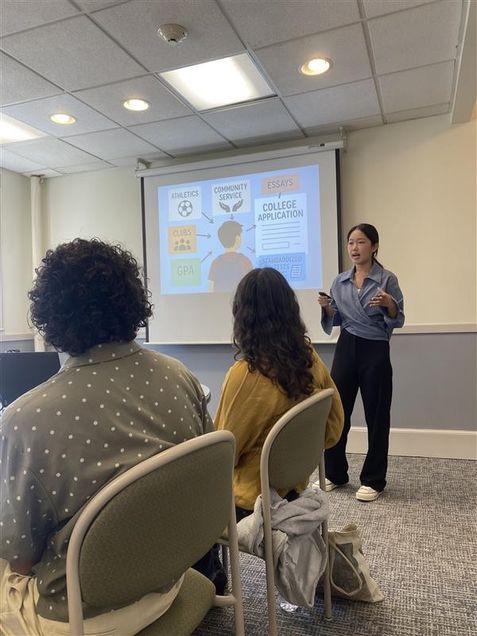 Xiawei “Kiwi” Yang (CAS ’27; Sociology and Business Administration) Xiawei “Kiwi” Yang (CAS ’27; Sociology and Business Administration) |
CAS Communications | “The Game of College Admissions: Different Rules, Same Pressure” | I grew up in China, where the education system is characterized by its reliance on the gaokao —the high-stakes college entrance exam administered simultaneously to millions of students nationwide. In contrast, U.S. colleges employ a more holistic review process, considering extracurricular activities such as athletics, club involvement, and community service. Previous research has investigated how these differences manifest in student outcomes; however, having experienced both systems firsthand, I wonder if these differences ultimately stem from a shared result-driven mindset, one that views admissions criteria as replicable templates and prestigious college acceptance as the measure of success. |